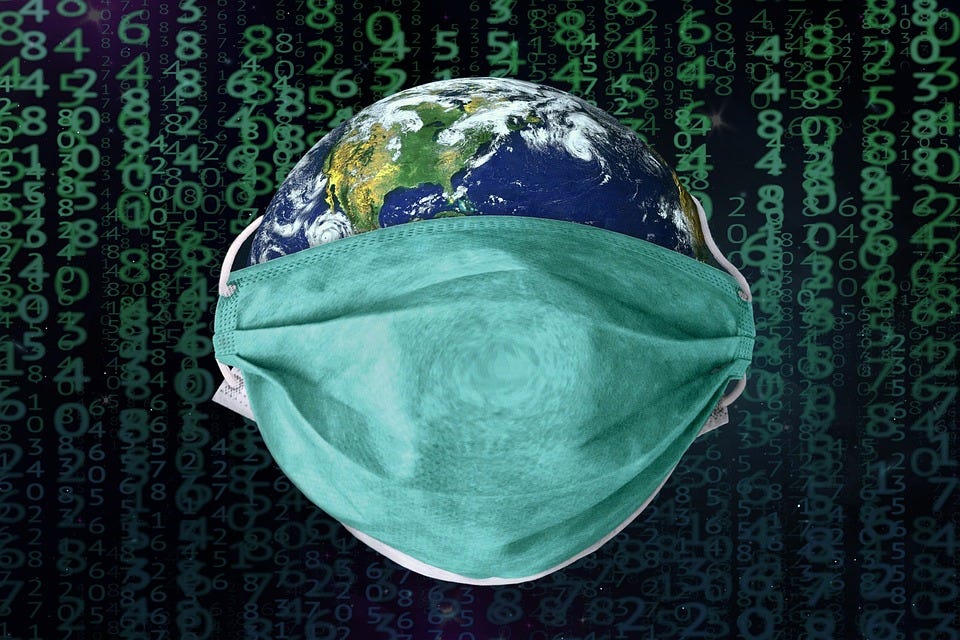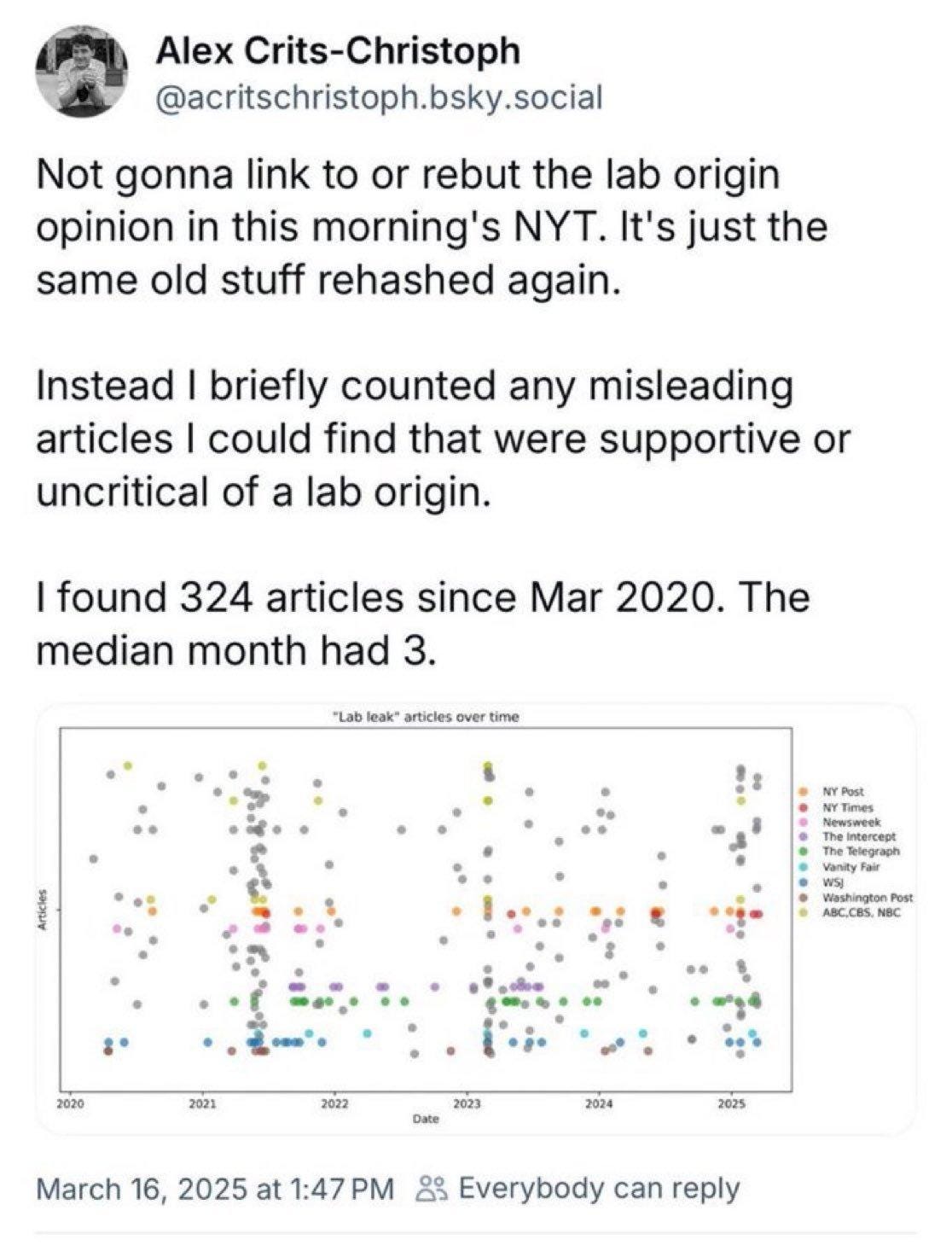Covering Up The Cover Up: Scientists Deny COVID Censorship Campaign
Many academics are pretending there was no censorship during the pandemic. They should know better.
The COVID-19 pandemic exposed a troubling streak in the science community: a willingness to tolerate and even celebrate censorship, all in the name of protecting the public from “misinformation.” Now, as the dust settles, some of those same voices are rewriting history, denying that censorship ever took place—a shameless attempt to manipulate us into forgetting the very clampdowns they once applauded.
This isn’t just hypocrisy; it’s a direct assault on the free speech and open inquiry that science needs to thrive. The same crowd that once crowed about silencing dissent now wants us to believe it was all a fever dream, and that’s a problem we can’t let slide.
Science goes authoritarian
Think back to 2020. As SARS-CoV-2 spread, so did ideas: some sharp, some shaky and others downright kooky (e.g. vaccines are “spike protein bioweapons”). During this time, the lab-leak hypothesis, along with debates about the efficacy of masking and various early treatment candidates swirled online—that is, until public-health officials drunk on their newfound power undertook massive, and often successful, campaigns to shut those conversations down.
Rather than engage the public and address their concerns about the pandemic response, many scientists and their allies in academia cheered as tech giants like Twitter, Facebook, and YouTube swung the banhammer at anyone who challenged the official narrative.
In fact, the science community routinely complained that the platforms were too lax in their efforts to censor contrarian perspectives, because “misinfo” (more on that loaded word below) was circulating between social media sites. For example, commenting on YouTube's October 2021 decision to tighten its moderation policies, a “misinformation researcher” at the University of California, Berkeley, complained to the Washington Post that “We had 18 months to think about these issues … why was this not [YouTube's] policy from the very beginning?”
The prestigious academic journal Nature made an even stronger case for censorship in April 2020, declaring that scientists had an obligation to help enforce online speech restrictions. “Researchers and policymakers can — and must — make sure social-media companies identify, implement and evaluate ways to curtail the spread of dangerous misinformation,” the article asserted.
Not to be outdone, the journal Science explicitly endorsed a proposal to kick certain accounts off Facebook in 2021 because they were key sources of mis- and disinformation. Quoting the Orwell-inspired Center for Countering Digital Hate (CCDH), Science declared that “Banning these 'superspreaders' could reduce the amount of misinformation significantly.” The vibe? Censorship wasn’t just okay—it was science’s trusty sidekick.
Some media scholars even suggested at one point that the federal government hire 10,000 internet librarians to curate the content people access online—yes, literal digital hall monitors to flood your timeline with pre-approved content. “Their work would be similar to the public interest obligation already applied to radio,” said Joan Donovan, a researcher at the Harvard Kennedy School “...[W]e legally require broadcasting serve the public interest, convenience, and necessity as a condition of having access to the airwaves. Social media companies should tune into the frequency of democracy, rather than the static of disinformation.”
Backdoor internet censorship
We know the US came perilously close to enacting this authoritarian policy thanks to documents contained in the Twitter files, released by journalist Matt Taibbi after Elon Musk purchased Twitter (X). Discovery material from a lawsuit brought against the federal government, Missouri v Biden, also exposed the administration’s efforts to censor the internet by proxy via the social media platforms. A coalition of executive agencies, state-funded NGOs and universities were actively working to erode First Amendment protections in the name of public health.
Screenshot from the Fifth Circuit ruling in Missouri v Biden
In an ironic twist, one of the plaintiffs in that case, Dr. Jay Bhattahcharya, is now serving as director of the NIH, America’s premiere biomedical research institution. Under Bhattahcharya’s leadership, the federal health bureaucracy will almost certainly abandon its efforts to regulate social media. But his experiences during the pandemic confirmed just how censorious his scientific colleagues can be.
Censorship, what censorship?
Fast forward to 2025. With all this evidence readily available, the same censorship cheerleaders in science are pulling a U-turn. Dissenting views weren't suppressed during the pandemic, they claim, because there was lots of contrarian content splashed across the internet throughout the COVID-19 era. Here's a typical example of this disingenuous rhetoric from microbiologist Alex Crits-Christoph, a prominent critic of the idea that the pandemic was caused by a lab leak.
This claim requires a level of denial no self-respecting scientist should even flirt with. Crits-Christoph can count as many articles as he likes, but we know social media platforms like Facebook had explicit policies that prohibited open discussion of the lab leak hypothesis. That policy was only rescinded in 2021 when the Biden Administration ordered US intelligence agencies to seriously investigate the lab-leak hypothesis. Not only does that confirm the policy's existence, it means Facebook was crafting its moderation rules around the federal government's preferences—a vindication of the Missouri v Biden plaintiffs.
This denial isn’t just galling—it’s a lie that threatens science itself. Free speech and inquiry aren’t optional extras; they’re the oxygen science breathes. The censors assumed they already had the answers when they clearly did not. For instance, there is now significant evidence–as some experts said at the time–that the lockdowns were a deadly mistake that led to more preventable deaths and wrought devastating economic consequences. But in part because those conversations weren’t allowed to play out naturally, the livelihoods of millions of people were discounted because a few smug gatekeepers in lab coats felt entitled to reorder the world without good evidence that their recommendations would actually stop the virus.
Science needs freedom
The bottom line is that you can’t get to the right answer in science if you assume you already know it and silence anyone who challenges you. Ironically, the very same academics who celebrated censorship during the pandemic suddenly understand the value of free inquiry now that their federal funding is on the DOGE chopping block.
To cite just one example, Scientific American, which in 2020 endorsed “an aggressive” government campaign “to remove markedly false information” from social media, has found its First Amendment bona fides in 2025. In a March 31 article opposing Trump Administration cuts to federal science funding, the magazine quoted an open letter from 1,900 scientists which complained that:
The quest for truth—the mission of science—requires that scientists freely explore new questions and report their findings honestly, independent of special interests. The administration is engaging in censorship, destroying this independence.
Those sentiments are true and noble. Indeed Pluribus has previously blasted efforts to silence scientists who challenge the political establishment. But Scientific American’s fair-weather defense of free inquiry still helps illustrate our point: it’s effectively impossible to do science when the federal government is breathing down your neck, isn’t it?
Conclusion
Science progresses when it’s messy, not managed. The pandemic showed us questions—about vaccines, origins, or lockdown policies—can’t be pre-answered by a self-appointed elite. Free speech lets the fringe breathe, and sometimes, the fringe is right. By cheering censorship then dodging accountability, these scientists don’t just undermine trust; they sabotage their own field’s future, as they’re now learning the hard way. It’s time they quit the revisionism and own the mess—science deserves better than a scrubbed slate.





